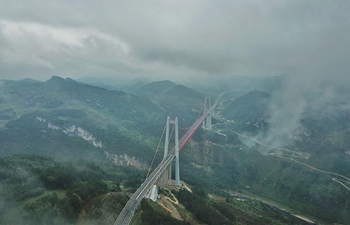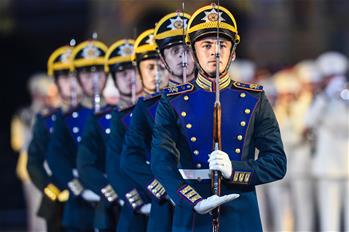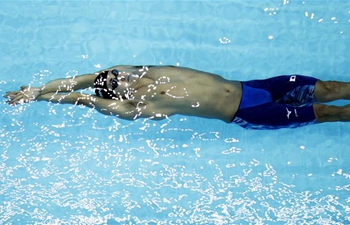WUHAN, Aug. 27 (Xinhua) -- At dusk, Cheng Fang held her three-year-old daughter in her arms, relaxing under a tree while her husband swam in the lake.
"We come here to the Donghu Lake when we have free time. My husband enjoys swimming in the lake in summer," she said. "We also go for a stroll or ride bicycles on the greenway throughout the year."
Donghu Lake, in the city of Wuhan, central China's Hubei Province, has an area of over 30 square km. The Donghu Lake Greenway, the first section of which opened in December 2016 and the second section opened last year, has a total length of more than 100 km.
Four years ago, Cheng settled down in Wuhan. "I didn't like the city very much when I first came here, but now, I think the city is beautiful with its lake and greenway," she said.
"The lake has become popular these last two years. My wife goes for a walk around the lake every day," said Xia Xing, 71.
Xia and his wife, Fu Fang, 64, grew up in Wuhan, and strolling around the lake has become an important part of their daily life.
"We used to walk at a playground in a university nearby, but now, I like to walk or cycle by the lake, which is very relaxing," Fu said.
However, in the 1980s, the lake was polluted by industrialization and urbanization.
"We grew up by the lake, and it was clear and free of pollution when we were little. But fewer and fewer people came to swim in the 1980s," Xia said. "Now, people are coming back to swim in the lake again."
Thanks to efforts by the local government, last year, the water quality of the lake was the best on record in recent 40 years.
"Nearly 10,000 tonnes of sewage has been stopped from going into the lake every day. Stopping sewage from going into the lake is an essential step for the ecological restoration of the lake," said Peng Xuesong with the Donghu Lake area's construction office.
The construction of the greenway has also helped improve the water quality. "Rain is filtered by trees and aquatic plants, which reduces the amount of pollutants that go into the lake and increases the lake's restoration capacity," said Zhang Xiaolin with Institute of Hydrobiology, Chinese Academy of Sciences.
The area has also developed a joint supervision mechanism between the local government and local organizations, and a lake protection conference is held annually to better improve the water quality and protect the lake's environment.

















